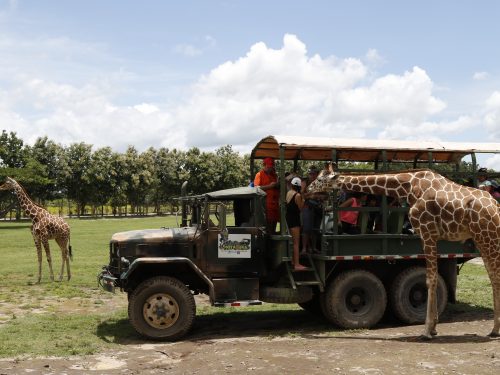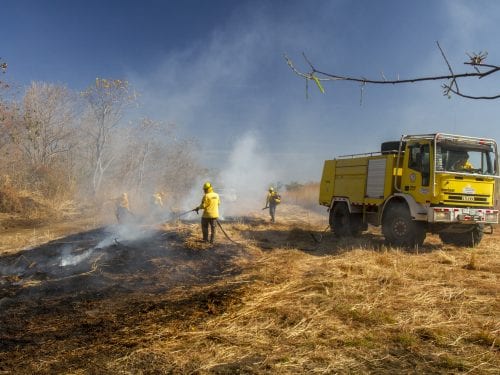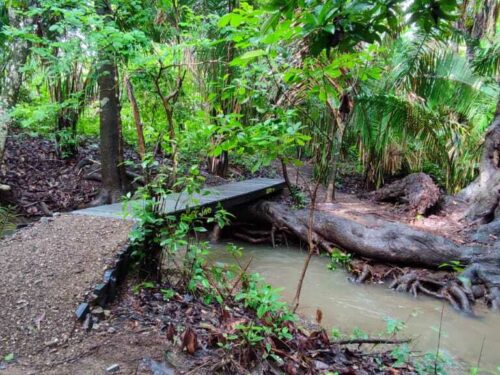
The National System of Conservation Areas (Spanish acronym: SINAC) filed a lawsuit against Ponderosa Adventure Park through Liberia’s court system for allowing and encouraging its visitors to feed the zoo’s animals, such as giraffes, zebras and dromedaries. The lawsuit was filed on October 6, 2022, confirmed the person in charge of wildlife in Guanacaste Conservation Area, Evelyn Solano.
The Voice consulted the Judiciary’s press department to confirm the investigation’s progress, but by the deadline for this article, we hadn’t received a response.
The park sells food such as carrots to visitors so they can interact with the animals during tours.
Because of this and other practices such as breeding species, , SINAC warned Ponderosa in September of 2020 that it must comply with measures in accordance with the Wildlife Conservation Law, but no immediate changes were made.
In April of 2021, the park received an ultimatum from SINAC to comply with the law. However, even now they continue to allow and promote the feeding of animals.
According to SINAC, Ponderosa Adventure Park did not comply with Article No. 116 of the Wildlife Conservation Law.
Article 116. Anyone who, without authorization from the National System of Conservation Areas, supplies unauthorized food or substances to wildlife shall be sanctioned with a fine of fifteen percent (15%) to thirty percent (30%) of one (1) base salary.
After the April 2021 notification, SINAC has done inspections of the zoo and concluded that visitors continue to give carrots to the animals.
According to Solano, the park has ignored the warnings.
The legal representative and the biologist in charge have been repeatedly notified that the practice of tourists feeding the zoo collection’s fauna is not authorized and must be eliminated, this in compliance with current regulations, the operating permit and the approved management plan,” she specified.
The businessman and owner of the zoo, David Patey, stated through his press officer, José Luis Rodríguez, that he would not provide any statements in this regard, after being consulted by The Voice.
Non-Conservation Practices
Between 2018 and 2021, SINAC lodged two administrative orders against Ponderosa for tourists not to feed the zoo’s fauna.
Laura Porras, a biologist who is an expert in biodiversity conservation and wildlife management, remarked that feeding animals in captivity is prohibited by law, because contact can favor the transmission of bacteria between humans and animals.
“There is a high degree of zoonosis (diseases of animal origin transmitted to humans) and anthropozoonosis (diseases that humans transmit to animals), in addition to animals changing their natural behavior and receiving a diet that is not natural for them,” Porras indicated.
In the April 2021 ultimatum, SINAC had notified Ponderosa that they had 10 days to come up with a plan that would prohibit tourists from feeding the zoo animals. The park’s social networks show that the interaction between visitors and animals continues.
It’s been indicated that Ponderosa has committed an alleged violation. In Costa Rica, these are offenses considered less serious than a crime. They are punished with fines and not imprisonment.

Since February of this year, Ponderosa has maintained a plan that prevents giraffes from reproducing in their zoo.Photo: David Bolaños
Reproduction Is Also Prohibited
Since February of this year, Ponderosa has maintained a plan that prevents giraffes from reproducing in their zoo. Photo: David Bolaños
Costa Rican law prohibits not only feeding and direct contact between tourists and wildlife, but also breeding animals in captivity.
Ponderosa had done it for years. In 2020, Patey acknowledged that 14 of the 15 giraffes in the zoo were born in captivity within the park.
In the April 2021 ultimatum, SINAC also prohibited the park from breeding the species in their collection.
As a result, on February 23, 2022, Ponderosa implemented a contraception plan that is in effect. The plan includes separating adult males from female giraffes, but they still have to finish building other barriers to separate the other species. They also have to finish building and start up a veterinary clinic.
To date, the zoo has already separated the adult male and female giraffes so that this species does not reproduce anymore,” Evelyn Solano pointed out.
Ponderosa Adventure Park is classified as a commercial zoo. These sites are not authorized for breeding animals, according to the Wildlife Conservation Law’s regulations (Executive Decree No. 40548-MINAE, of 2017).
Biologist Laura Porras affirms that captive reproduction of wildlife is a delicate and costly process. “This process should only be done when it has been scientifically proven that the species in question is threatened in the wild and that the release of new individuals is an alternative for its recovery,” she explained.
She also added that there should be strict genetic control to avoid inbreeding (mating of related animals), and in Ponderosa, reproduction has occurred between the same individuals for several years.
Reproducing giraffes here in Costa Rica, claiming that it will contribute to the conservation of populations in Africa, is a lie, especially considering that these giraffes are in contact with people and are even fed carrots by tourists… there are no carrots in the natural habitat of giraffes,” the expert emphasized.
The biologist added that it should be taken into account that keeping exotic animals (not native to Costa Rican territory) in captivity is even risky for the local ecosystem, and that risk increases with reproduction. Furthermore, if one or more of the animals found in Ponderosa escape, it would be a disaster for the local wildlife and ecosystem.
___________________________________________________







Comments